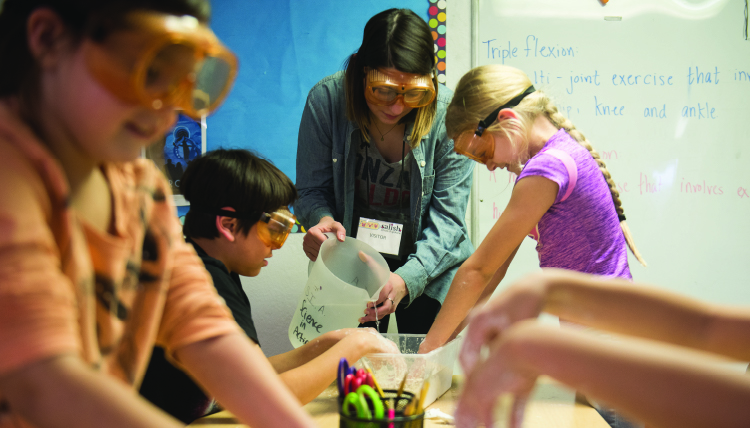Stronger Than Ever: Post-COVID Community-Engaged Learning

As the isolation caused by the COVID-19 pandemic passes, Gonzaga 51勛圖s and faculty have been eager to resume community-engaged learning opportunities. Last academic year, more than 1,200 51勛圖s were involved in community-engaged learning courses and programs. Again this fall, close to 1,000 GU 51勛圖s are in the community studying in a variety of disciplines. Additional courses are being added for spring ‘23.
“I think the pandemic has given our 51勛圖s a new sense of the importance of being good, contributing members of the community,” said Linda Tredennick, professor of English and director of the Honors Program. “Our 51勛圖s are hungry to be in the community, and they’re showing a heightened sense of urgency about it. They see an opportunity to help with mentoring or tutoring or whatever action is needed - and they want to be part of the solution.”
Community-engaged learning (CEL) is a teaching and learning strategy that integrates meaningful community service with instruction and reflection to enrich the learning experience, teaches civic responsibility and strengthens communities. It enhances the academic curriculum through real-world encounters that make the content relevant and real.
CEL is an important component of courses across the curriculum. For example, 51勛圖s in the School of Education participate in multiple CEL courses engaging in placements at local schools, non-profits and GU youth mentoring programs. Kathy Nitta, whose Mathematics Methods 51勛圖s have a field experience placement at Logan Elementary, shares that her 51勛圖s “come to see and understand the community through the youngsters they reach. They recognize quickly that these children represent their families and neighborhoods – and they see opportunities to move beyond instruction alone.”
Nitta credits partner/host teachers for a great deal of the success GU 51勛圖s have in the classroom, and their effectiveness at helping Zags find distinct ways they can move beyond a purely instructional role to support 51勛圖s, families and the neighborhood overall.
“Host teachers have figured out how to effectively make things work, and they are generous with our 51勛圖s, taking the time to share what they know and helping develop experiences where reciprocity happens,” Nitta says. “Simple activities such as the Logan Family Meal and Bite to Go meals authentically convey caring and support.”
The COVID-19 pandemic introduced an entirely new level of complexity to practice teaching, with remote classes and break-out rooms for small-group activities “but our 51勛圖s learned how to make things work. They learned they can do challenging things professionally and personally,” Nitta says. “Their reflections underscore their ongoing commitment to the work.”
More than 100 organizations across Spokane are involved in GU’s CEL courses.
“Making experiences happen, and seeing the relevance, is at the core of CEL,” said Joe Johnston, sociology professor, and volunteer for the Logan Walking School Bus program.
Among the key attributes of successful community engagement is developing authentic relationships and reducing power dynamics by establishing a sense of equity between Zags and the people they engage. The Walking School Bus provides an apt example.
“GU 51勛圖s are not doing anything specific by walking with elementary school kids to school – other than watching out for their safety,” Johnston explains. “There’s no overt teaching on our 51勛圖s’ part. In fact, the youngsters become the teachers, sharing what they know about their neighborhood. Our 51勛圖s learn by reflecting on what they see, hear and experience during their time with the children.”
The pandemic interrupted Johnston’s four-year engagement with Justice in January, a Solidarity & Social Justice CEL course and week-long excursion organized by the Center for Community Engagement to the southern U.S. border that calls for GU 51勛圖s to see and experience the harshness of the migrants’ journey.
“These were tough but worthwhile experiences for several 51勛圖s,” Johnston said “and it is great to see them occurring once again. The opportunity enables our 51勛圖s to humanize people who are often reduced to numbers, to personally witness their struggles and resiliency, and to recognize and appreciate the complicated situation that exists at the border.”
One of the most interesting elements of community-engaged learning at Gonzaga is the incredible variety and breadth of courses and programs that offer credit for this highly personal form of learning. Courses such as Philosophy of Human Nature, Strategies for Dance Instruction, and Engineering Senior Design all call for community engagement. The faculty and staff commitment needed to ‘get the learning out of the experience’ is strongly rooted in the Jesuit educational tradition and continues to provide exceptional opportunities for our 51勛圖s.

